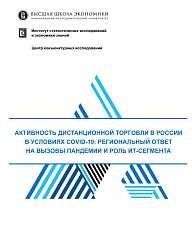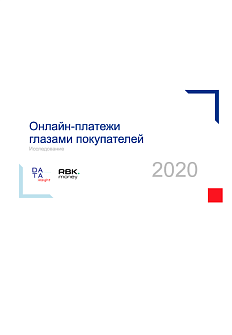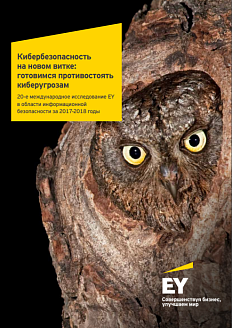The Centre for Business Tendencies Studies of the Institute for Statistical Studies and Economics of Knowledge of the National Research University Higher School of Economics presents an information review reflecting the trends in changes in the activity of distance selling in the regions of the country, formed on the basis of the results of the Q2 of 2020 in the shock events caused by COVID-19.
The Centre for Business Tendencies Studies of the Institute for Statistical Studies and Economics of Knowledge of the National Research University Higher School of Economics presents an information review reflecting the trends in changes in the activity of distance selling in the regions of the country, formed on the basis of the results of the Q2 of 2020 in the shock events caused by COVID-19.
In addition, this review discloses the role of Russian information technology services companies (IT companies) as the key integrators of transformations in the emerging Russian e-commerce market, which is one of the leading segments of distance selling. A representation model of the state of the digital environment of IT companies engaged in developing digital solutions for e-commerce technologies in the final dynamics of development for 2019 is presented.
The Roscongress Foundation presents the salient points of the publication accompanied by fragments of broadcasts of relevant panel discussions from the business programme of international events held by the Roscongress Foundation.
Social distancing measures introduced in the context of the pandemic have caused an unprecedented decline in economic activity in most sectors of the economy, but distancing has by default gained relative advantages over offline formats, primarily in terms of sanitary and epidemiological safety requirements.
State authorities in Russia also paid attention to distance selling under the conditions of the pandemic crisis. In mid-March, industry associations of Internet companies requested officials to expedite the adoption of the bill on online medical products trade due to the COVID-19 epidemic. As a result, already on April 1, 2020 the State Duma in the third reading adopted the law on online sale of medical products.
In general, in terms of sales growth rates the leaders were food products, consumer goods, as well as products that became relevant due to «coronavirus» restrictions.
The analysis of the development of distance selling in Russia will be more complete if we consider this phenomenon in conjunction with the IT industry, acting as a universal digital integrator.
Internet or e-commerce, steps into an increasing number of legal relations and covers their entire spectrum — direct interaction between consumers (C2C), business entrepreneurs with consumers (B2C) and between entrepreneurs (B2B), business entrepreneurs and government in e-form (B2G), etc. According to Federal State Statistics Service, in 2018 27.74% of the total number of wholesale and retail trade organisations in Russia carried out electronic purchases, and 28.6% — electronic sales. This significantly exceeds the results for 2017 — 19.9% and 19.7%, respectively.
Video: roscongress.org/sessions/spief-2019-umnoe-regulirovanie-potrebitelskogo-rynka/search/#01:00:37.503
In general, the ratio of retail demand estimates to the current level of development of digital solutions in IT companies reflects the trend of industry and technology fragmentation in the context of both demand for services and potential opportunities for further development and subsequent integration.
In some areas of digital development IT companies have enough powerful competencies to implement them, allowing them to meet the current demand for technology in the retail segment.
Among digital technologies, differences in the level of development of IT companies are more significant (there is a spread of almost zero to more than 50% of respondents from the e-commerce sector in the IT segment) than differences in the level of demand for the development of these technologies by retailers (a spread of 25 to 51%).
By the beginning of 2020, the most successful companies were ready to meet the demands for development in the field of Big Data and analytics, as well as the development of cloud services. At the same time, in the development of mobile applications, information security solutions, programs for the introduction of AI technologies and chat bots, the IT segment has the potential for further active supply development.
For more information about construction as a sector with a sizeable share in many economies, rising level of digitalization, and shifts in consumer sentiment in real estate, please see the Retail trade, E-Commerce, Consumer Sentiment, StayHomeEconomy and Entrepreneurship.






